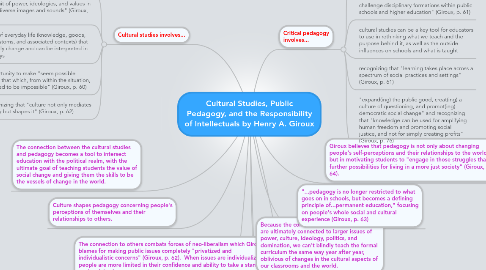Cultural Studies, Public Pedagogy, and the Responsibility of Intellectuals by Henry A. Giroux
作者:Amy Parkinson

1. Culture shapes pedagogy concerning people's perceptions of themselves and their relationships to others.
2. The connection to others combats forces of neo-liberalism which Giroux blames for making public issues completely "privatized and individualistic concerns" (Giroux, p. 62). When issues are individualized, people are more limited in their confidence and ability to take a stand against injustice.
3. The connection between the cultural studies and pedagogy becomes a tool to intersect education with the political realm, with the ultimate goal of teaching students the value of social change and giving them the skills to be the vessels of change in the world.
4. Cultural studies involves...
4.1. "the social field where goods and social practices are not only produced, distributed, and comsumed bugt also invested with various meanings and ideologies" (Giroux, p. 59)
4.2. "a circuit of power, ideologies, and values in which diverse images and sounds" (Giroux, p. 59)
4.3. aspects of everyday life (knowledge, goods, social customs, and associated contexts) that continually change and can be interpreted in many ways
4.4. an opportunity to make "seem possible precisely that which, from within the situation, is declared to be impossible" (Giroux, p. 60)
4.5. recognizing that "culture not only mediates history but shapes it" (Giroux, p. 62)
5. A quote that hit home with me: "Historical learning... is not about constructing a linear narrative but about blasting history open, rupturing its silences, highlighting its detours, acknowledging the events of its transmission, and organizing its limits within an open and honest concern with human suffering, values, and the legacy of the often unrepresentable or misrepresented" (Giroux, p. 68).
6. Because the contexts in which educators work are ultimately connected to larger issues of power, culture, ideology, politics, and domination, we can't blindly teach the formal curriculum the same way year after year, oblivious of changes in the cultural aspects of our classrooms and the world.
7. Giroux believes that pedagogy is not only about changing people's self-perceptions and their relationships to the world, but in motivating students to "engage in those struggles that further possibilities for living in a more just society" (Giroux, p. 64).
8. "...pedagogy is no longer restricted to what goes on in schools, but becomes a defining principle of...permanent education," focusing on people's whole social and cultural experience (Giroux, p. 63)
9. Critical pedagogy involves...
9.1. taking a second look at the limitations of current pedagogy - rarely are issues of democracy, citizenship, and personal struggle addressed in relation to what occurs outside the classroom and the ways in which personal responsibility and action are related
9.2. utlilizing cultural studies "as a resource [for] educators who can then teach students how to look at the media... to reform the curricula and challenge disciplinary formations within public schools and higher education" (Giroux, p. 61)
9.3. cultural studies can be a key tool for educators to use in rethinking what we teach and the purpose behind it, as well as the outside influences on schools and what is taught
9.4. recognizing that "learning takes place across a spectrum of social practices and settings" (Giroux, p. 61)
9.5. "expand(ing) the public good, creat(ing) a culture of questioning, and promot(ing) democratic social change" and recognizing that "knowledge can be used for amplifying human freedom and promoting social justice, and not for simply creating profits" (Giroux, p. 76)
10. The bottom line for educators: Think outside the box, don't be afraid to challenge authority or the status quo, and remember that, as educators, it is our job to make learning meaningful for students.


